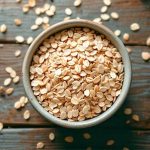Takeaways
- Fiber supplements can help fill nutritional gaps in modern diets
- Different types of fiber supplements offer varied benefits
- Proper usage and dosage are essential for optimal results
- Fiber supplements can support digestive health and regularity
- Combining supplements with a balanced diet maximizes benefits
Understanding Fiber Supplements
Fiber supplements are a common way to increase fiber intake when diet is not enough. They aim to replicate the benefits of natural dietary fiber, which is a type of carbohydrate found in plants that humans cannot fully digest. This undigested fiber passes through our system mostly intact.[1]
Many modern diets lack enough fiber due to the consumption of processed foods, quick meals, and busy schedules. Individuals often consume less fiber than what is recommended daily. Fiber supplements help address this gap in nutrient intake.[2]
Fiber supplements provide an easy way to make up for dietary fiber deficiencies. They are available as powders, capsules, and gummies. These products contain concentrated sources of fiber, designed to mimic how natural dietary fiber functions in the body.[3]
Types of Fiber Supplements
Soluble Fiber Supplements
Soluble fiber dissolves in water, forming a gel-like substance. It slows down digestion. Common sources found in supplements include psyllium, inulin, and methylcellulose.[4]
Soluble fiber supplements can help lower cholesterol and regulate blood sugar levels. They also promote a feeling of fullness, which can aid in managing weight. Soluble fiber acts as a prebiotic, supporting the growth of beneficial bacteria in the gut.[5]
Insoluble Fiber Supplements
Insoluble fiber does not dissolve in water. It adds bulk to stool and aids in moving food through the digestive tract. Common sources in supplements include wheat bran, cellulose, and lignin.[6]
Insoluble fiber supplements primarily improve digestive health. They can alleviate constipation and encourage regular bowel movements, while also promoting overall gut health by helping to maintain a healthy pH level in the intestines.[7]
Blended Fiber Supplements
Some supplements combine both soluble and insoluble fibers. These products attempt to provide a wider range of health benefits by closely mimicking the fiber profile found in whole foods.[8]
Blended fiber supplements offer a comprehensive method of fiber intake, addressing various aspects of digestive and overall health. They can be especially useful for people who desire a diverse set of fiber benefits from a single supplement.[9]
Benefits of Fiber Supplements
Fiber supplements offer several potential health benefits. They can support digestive health, promote regularity, and possibly assist with weight management. Here are some of the potential advantages.[10]
- Improved bowel regularity
- Reduced constipation
- Lower cholesterol levels
- Better blood sugar control
- Increased feelings of fullness
- Support for weight management
- Improved gut health
These benefits come from how fiber interacts in the body. Fiber adds bulk to stool, making it easier to pass. It also supports the growth of beneficial gut bacteria, creating a healthier microbiome. Some fibers can bind to cholesterol, helping the body remove it.[11]
How Fiber Supplements Work
Fiber supplements work similarly to fiber from whole foods. They travel through the digestive system largely undigested, interacting with digestion and gut health along the way.[12]
In the stomach, fiber absorbs water and expands, creating a feeling of fullness that can help control appetite. As fiber passes through the small intestine, it can slow down the absorption of sugars and fats, which may help regulate blood sugar and cholesterol levels.[13]
| Effect | Soluble Fiber | Insoluble Fiber |
|---|---|---|
| Water absorption | High | Low |
| Gel formation | Yes | No |
| Fermentation by gut bacteria | High | Low |
| Stool bulking | Moderate | High |
| Transit time | Slows | Speeds up |
Choosing the Right Fiber Supplement
Choosing a fiber supplement involves considering personal health needs and goals. Think about the type of fiber, the form of the supplement, and any additional ingredients.[14]
Specific health conditions influence supplement choices. For example, those with constipation may benefit more from insoluble fiber, while people managing cholesterol might prefer soluble fiber. Consulting a healthcare provider can help determine the best option.[15]
Here are steps you can follow when choosing a fiber supplement:
- Identify your primary health goal
- Research different types of fiber
- Consider supplement forms (powder, capsule, gummy)
- Check for additional ingredients or allergens
- Start with a low dose and gradually increase
Proper Usage and Dosage
Using fiber supplements correctly helps ensure maximum benefits and reduce potential side effects. Start with a small dose and increase gradually over time to allow your body to adjust and minimize digestive discomfort.[16]
Most adults should consume 25-30 grams of total fiber daily from all sources. If using supplements, begin with about 3-5 grams per day, gradually increasing over several weeks until you reach your target. Always follow product instructions and advice from your doctor.[17]
Adding fiber supplements into daily routines can be easy. Many people mix powder supplements into morning smoothies or drinks, while capsules or gummies can be taken with meals. Regular intake is important to see the benefits of fiber supplementation.[18]
Potential Side Effects and Precautions
While generally safe, fiber supplements can cause side effects in some individuals, including gas, bloating, and abdominal discomfort. These effects often lessen as your body adjusts to the increased fiber intake.[19]
Taking certain precautions can help minimize potential problems. Always take fiber supplements with plenty of water, which helps prevent constipation and supports fiber’s passage through the digestive system. Avoid taking large doses all at once.[20]
Here are some situations where you should use caution with fiber supplements:
- If you have a history of bowel obstructions
- When taking certain medications
- If you have difficulty swallowing
- Before any surgical procedures
- If you have undiagnosed digestive symptoms
Fiber Supplements vs. Natural Sources
Comparing fiber supplements to whole food sources reveals pros and cons for each. Whole foods provide fiber along with other essential nutrients. They offer a more complete nutritional package, but reaching daily fiber goals through diet alone can be challenging for some.[21]
Fiber supplements offer convenience and allow for precise measurement of fiber intake. However, they do not provide the additional nutrients found in whole foods. Ideally, a combination of both whole foods and supplements can help meet daily fiber requirements.[22]
| Source | Fiber Content | Additional Nutrients | Convenience |
|---|---|---|---|
| Supplements | High, concentrated | Limited | Very high |
| Whole grains | Moderate | Vitamins, minerals | Moderate |
| Fruits | Varies | Vitamins, antioxidants | High |
| Vegetables | Varies | Vitamins, minerals | Moderate |
| Legumes | High | Protein, minerals | Low |
Fiber Supplements for Specific Health Conditions
Digestive Health
Fiber supplements can be helpful for managing digestive issues. They add bulk to stool, which can assist with both constipation and diarrhea. For people with irritable bowel syndrome (IBS), some fiber supplements may help manage symptoms.[23]
Specific digestive issues that may benefit from fiber supplementation include chronic constipation, diverticulosis, and hemorrhoids. Fiber helps promote regular bowel movements and reduces strain during defecation, which can relieve symptoms and prevent complications.[24]
Weight Management
Fiber supplements can play a role in weight management. They can promote feelings of fullness, which might lead to a reduced calorie intake. Soluble fiber, in particular, forms a gel in the stomach that can slow digestion.[25]
The effect of fiber on feeling full can help control appetite. This might result in less snacking and smaller portion sizes during meals. While not a weight loss solution by itself, fiber supplements can be helpful when combined with a balanced diet and exercise.[26]
Heart Health
The connection between fiber intake and heart health is well-established. Soluble fiber, specifically, can help lower cholesterol levels by binding to cholesterol in the digestive system, preventing it from entering the bloodstream.[27]
Fiber supplements may support heart health in several ways. They can help lower LDL (bad) cholesterol levels and promote healthy blood pressure. The impact of fiber on weight management can also indirectly benefit heart health.[28]
Combining Fiber Supplements with Diet and Lifestyle
A holistic approach to health is important when using fiber supplements. They should enhance, not replace, a balanced diet with plenty of whole foods. Fiber supplements are most effective as part of an overall healthy lifestyle.[29]
Integrating fiber supplements into a balanced diet involves tracking total fiber intake. Monitor the fiber you get from food and add supplements to reach your daily goal, spreading intake throughout the day for best results, which helps maintain steady digestion and energy.[30]
Lifestyle habits that complement the benefits of fiber supplements include regular exercise and drinking enough water. Physical activity supports digestive health and regularity. Water helps fiber work effectively in the body. Managing stress and getting enough sleep also contribute to overall digestive health.[31]
Common Myths and Misconceptions
Many myths surround fiber supplements, which can confuse consumers. Addressing these misconceptions can help people make informed decisions about using these supplements. Here are a few common myths about fiber supplements:
- All fiber supplements are the same
- Fiber supplements can replace fiber from whole foods
- More fiber is always better
- Fiber supplements cause weight loss on their own
- Only older adults need fiber supplements
- Fiber supplements are only for constipation
In reality, different types of fiber supplements offer various benefits. While helpful, they don’t provide all the nutrients found in whole foods. Too much fiber can cause digestive issues. Fiber supports weight management but is not a complete weight loss solution. People of all ages may benefit from fiber supplements if their diets lack sufficient fiber. Fiber supplements can help with more than just constipation.[32]
Future of Fiber Supplements
The field of fiber supplementation continues to develop, with current research focusing on creating more effective products. Scientists are studying new sources of fiber and researching their specific health benefits.[33]
Potential improvements in fiber supplement formulas include better taste and texture. Manufacturers are working on products that are easier to mix with foods and drinks. There’s also interest in creating fiber supplements with extra functional benefits, such as added probiotics or vitamins.[34]
A growing understanding of gut health may greatly influence future fiber supplements. Research into the gut microbiome is showing new ways that fiber affects overall health. This knowledge may lead to more customized fiber supplements that are tailored to individual gut health needs.[35]
FAQ: People Also Ask
How long does it take for fiber supplements to work?
Can you take too much fiber?
Do fiber supplements interfere with medication absorption?
Are fiber supplements safe for children?
Can fiber supplements help with constipation?
What’s the difference between prebiotic fiber and other types of fiber supplements?
Are there any foods I should avoid when taking fiber supplements?
How do fiber supplements affect gut bacteria?
Fiber supplements provide a convenient source of fiber when dietary intake is insufficient. Dietary fiber is not broken down by digestive enzymes and passes through the digestive tract, performing many beneficial functions.
Processed foods, which dominate many modern diets, are typically low in fiber. This can lead to insufficient daily fiber intake, and fiber supplements can help increase consumption.
Fiber supplements offer an accessible way to increase fiber intake. They are formulated to emulate the effects of natural dietary fiber.
Soluble fiber forms a gel in the digestive tract, which slows down digestion, which is beneficial in many ways. The stated sources are common.
The gel formed by soluble fiber can help bind to cholesterol, lowering its absorption. It can also slow the release of glucose. It feeds beneficial gut bacteria. All of this is true.
Insoluble fiber doesn’t dissolve in water and moves through the digestive tract unchanged, adding bulk to waste. The listed sources are correct.
Insoluble fiber’s ability to add bulk to stool is helpful to alleviate constipation and improve regularity, as well as improve overall digestive health. The point regarding maintaining a healthy pH is less clear, though is likely to provide a degree of benefit.
Combining both types of fiber aims to provide a more comprehensive range of health benefits, as whole foods contain a mix of both. This approach has potential to offer benefits of both.
Blended fiber supplements are designed to address a wider range of digestive health issues. They may be beneficial for individuals who wish to get a diverse range of benefits from a single supplement.
The stated potential benefits are true. These are the commonly advertised effects of fiber supplementation. Evidence varies as to the strength of the claims, but are generally considered true.
The listed mechanisms of fiber in the body are correct and how it exerts it’s benefits.
Fiber from both supplements and whole foods behave similarly within the digestive tract.
Fiber absorbs water and expands in the stomach, creating a feeling of fullness. In the small intestine, it can slow the absorption of sugars and fats, which can regulate blood sugar and cholesterol levels.
Choosing a fiber supplement should be based on individual health needs and goals, considering the type of fiber, form, and any additional ingredients.
The advice about constipation and cholesterol is generally true. Medical professional can assist to determine the best choice.
Starting with a low dose and increasing gradually allows the body to adjust to the increased fiber intake, which helps to minimize digestive discomfort.
The recommended daily intake is generally accurate. When supplementing, it’s best to start with a small dose and gradually increase over time, and to follow product instructions and doctor advice.
The methods of consuming fiber supplements listed are accurate, and regular intake is necessary for consistent benefits.
These side effects are common and tend to decrease as the body adapts to increased fiber consumption.
Drinking plenty of water and not taking large doses of fiber at once helps to minimize the risk of digestive issues.
Whole foods are the ideal source of fiber, but if they aren’t meeting recommended levels, then supplementation may be needed.
Fiber supplements provide a convenient way to reach daily fiber goals but don’t offer the complete nutritional profile of whole foods. A combination of both is ideal.
Fiber can add bulk to stool, helping with both constipation and diarrhea, and may offer relief for those with IBS.
Fiber promotes regular bowel movements and reduces strain during defecation, which can help relieve symptoms associated with chronic constipation, diverticulosis, and hemorrhoids.
Fiber supplements can contribute to weight management by promoting feelings of fullness and slowing digestion which can lead to reduced calorie intake.
The effect of fiber on fullness can help with controlling appetite, which can lead to less snacking and smaller portions. However, fiber supplements alone are not a weight loss solution.
Soluble fiber’s action in the digestive tract can lower the absorption of cholesterol, which has a positive impact on heart health.
Fiber’s positive impacts on cholesterol, blood pressure, and weight management can all improve heart health.
Fiber supplements are not a replacement for a healthy diet, and should be viewed as a supplement to support other healthy habits.
It’s best to track overall fiber intake, from both food and supplements, to reach daily goals. Spreading the intake through the day can help maintain steady digestion and energy levels.
Regular exercise, adequate water intake, stress management, and proper sleep contribute to the effectiveness of fiber supplements and overall digestive health.
The point about the different types of fibers is valid. The listed limitations of supplementation, that overconsumption can cause side effects, that they do not provide all the nutrients as whole foods, and that they are not a weight loss solution are also accurate.
Research into fiber supplements is a developing field. Current research is focusing on more effective products, as well as studying different fiber sources and the specific health benefits.
Manufacturers are trying to make fiber supplements more palatable and convenient. There is also interest in increasing functionality, such as adding probiotics or vitamins.
Research into the gut microbiome is expanding, and this could result in more customized fiber supplements that are targeted at individual gut health needs.
While the timeframe varies, the listed timeframes for fiber supplements to work are generally accurate.
Excessive fiber intake can lead to bloating, gas, and constipation. It’s always advisable to start with small doses and gradually increase.
Fiber supplements can potentially interact with some medications, so it is recommended to take them at least 2 hours before or after other medications. Consulting a healthcare provider is also advised.
Fiber supplements may be appropriate for children but it is better to focus on whole food fiber where possible, and get medical advice first.
Fiber’s ability to add bulk to stool can be helpful to relieve constipation, as long as enough water is being consumed.
Prebiotics act to support the growth of healthy gut bacteria, while other types of fiber may have different primary purposes, although there is some overlap.
Introducing high-fiber foods gradually can reduce the likelihood of digestive issues.
Some fibers, especially prebiotics, provide food for beneficial gut bacteria, leading to a healthier gut microbiome.



